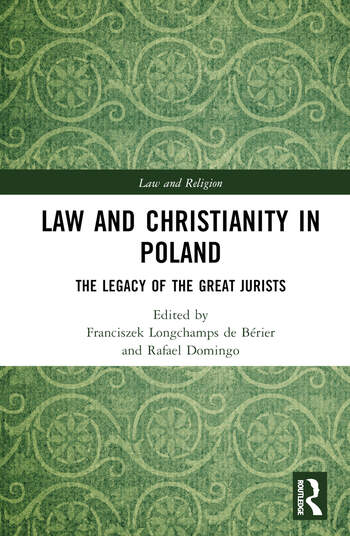
The Polish Contribution to the Global Legal Culture
John Witte, Jr.
The following is excerpted from Law and Christianity in Poland: The Legacy of the Great Jurists, edited by Franciszek Longchamps de Bérier and Rafael Domingo and out now from Routledge.
This volume is another signature title in the book series on “Great Christian Jurists in World History.” This multi-volume series presents the interaction of law and Christianity over the past two millennia, using intellectual biographies of one thousand major legal figures from biblical times until today. Commissioned by the Center for the Study of Law and Religion at Emory University, each volume in this series focuses on a specific country, region, or era and samples the life and work of a score or more of its greatest legal minds over the centuries. These figures include not only civil, common, and canon law jurists and judges but also theologians, philosophers, and leaders of the church, state, society, and the academy. What commends each figure for inclusion in this series are their decisive contributions to legal ideas and institutions, their leadership in major legal reform or resistance movements, and/or their efforts to craft landmark constitutions, treatises, treaties, statutes, canons, or cases. Thus, familiar Christian jurists like Gratian, Grotius, Blackstone, Story, Kuttner, and Scalia appear in this series. But so do Augustine, Isidore, Aquinas, Calvin, Bonhoeffer, Maritain, and Romero. This biographical approach is not intended to deprecate institutional, doctrinal, social, or intellectual histories of law and religion, nor will it devolve into a nostalgic form of Christian confessional hagiography. It is, instead, designed to offer a simple method and common heuristic to study the interaction of law and Christianity around the world over the past two millennia.
[This biographical approach is] designed to offer a simple method and common heuristic to study the interaction of law and Christianity around the world over the past two millennia.
Columbia University Press opened this “Great Christian Jurists” series in 2006-07 with a three-volume work on Modern Christian Teachings on Law, Politics, and Human Nature, featuring nearly thirty modern Catholic, Protestant, and Orthodox Christian figures. Cambridge University Press has published new titles on great Christian jurists and legal collections in the first millennium, as well as in English, Spanish, French, Lowlands, and American history. Routledge has taken up the Italian, Nordic, Welsh, Russian, and Latin American stories; Mohr Siebeck the German story; and Federation Press the Australian story. Forthcoming titles will cover great Christian jurists in the history of Scotland, Ireland, Austria, Switzerland, Greece, and, eventually, various countries and regions in Eastern Europe, Central Eurasia, the Middle East, Eastern, Western, and Southern Africa, the Pacific Rim, and Southeast Asia.

In the present volume, two leading Catholic jurists and legal historians, Professor Franciszek Longchamps de Bérier (Jagiellonian University) and Professor Rafael Domingo (Emory University/University of Navarra) have combined their talents and networks to create a brilliant new account of Law and Christianity in Poland: The Legacy of the Great Jurists. The volume features fresh, crisp essays commissioned from a score of leading experts on Polish law and religion, almost all of them Polish academics. The authors of these chapters have made these historical Polish jurists vividly present to us by translating their texts, terms, and ideas into accessible and authoritative forms for Anglophone readers.
Twenty-one great legal, religious, and political figures in Polish history come to life in these pages. A fine editorial introduction sets these figures within the millennium-long tumultuous and sometimes tragic political and religious history of Poland. The collection begins with several medieval legal figures, including Master Vincentius, the twelfth-century father of Polish culture, language, and law. It also includes the powerful fourteenth-century Queen Jadwiga, whose pioneering work in support of church and state, and of religious and legal education led to her later canonization. Later leaders of church and state also come in for close analysis. Notable is sixteenth-century Queen Anna Jagiellon, a devout Catholic who strengthened Poland’s longstanding policy of granting freedom to all peaceable Catholics, Orthodox Christians, Protestants, and Jews. Her pioneering efforts were echoed and elaborated by several later Polish jurists and churchmen over the centuries, notably Cardinal Wyszyński, a modern champion of religious freedom during the communist period as well as an exemplary Catholic pastor, canonist, and hierarch.
Almost all of the “great Christian jurists” included for study herein will be new to non-specialists in the English-speaking world. Two exceptional Polish figures are much better known, but readers may be surprised to see them counted among “great Christian jurists.” The first figure is Nicolaus Copernicus, the famous astronomer and polymath, who proved that the sun, not the earth, is at the center of the universe. What is less known today is that Copernicus was also an exceptional jurist in his day, who made an enduring contribution to the reform of the Polish church’s canon law as well as to economic law and monetary theory. The second figure is Cardinal Wojtyła, who led the Polish church and people in their political resistance to communism. Wojtyła is far better known to the world as Pope John Paul II. From 1978 to 2005, he led the Catholic Church in its transformative embrace of religious freedom, human rights, and democratization for all, as well as in promulgating the 1983 Code of Canon Law and the 1990 Code of Canons of the Eastern Churches that still govern much of the global Catholic world.
Readers of these chapters will learn a great deal about the power, prescience, and pervasiveness of several distinct Polish legal ideas and institutions — concerning civil and criminal procedural rights, natural law theory, rule of law, conflict of laws, constitutional monarchy, and democracy, separation of powers, and the delicate balance of privileging the majority Roman Catholic Church and protecting various religious and cultural minorities. What has helped to make Polish law so distinctive is its remarkable legal eclecticism, and the ready transplantation and integration by inventive jurists over the centuries of various legal norms and procedures of indigenous legal traditions, European civil law, Anglo-American common law, and Russian and other Slavic legal systems. What has also helped to make Polish law so distinctive is the pervasive influence of Catholic teachings throughout the second millennium. Time and again, major historical legal figures brought to novel legal expression several fundamental Christian values — faith, hope, love, solidarity, inclusion, forgiveness, reconciliation, hospitality, charity, and respect for human dignity. It is no accident that it was late medieval Poland that opened wide its borders and communities to the many thousands of Jews who were driven from Western European lands during the shameful scourge of inquisition and pogrom. And it is no accident that Poland today has again opened its hearts and homes to hundreds of thousands of neighboring Ukrainians who are fleeing the brutal Russian genocide. ♦

John Witte, Jr., JD (Harvard); Dr. Theol. h.c. (Heidelberg), is Robert W. Woodruff Professor of Law, McDonald Distinguished Professor of Religion, and Faculty Director of the Center for the Study of Law and Religion at Emory University. A specialist in Legal History, Human Rights, Religious Freedom, Marriage and Family Law, Law and Religion, he has 300 published articles, 19 journal symposia, and 45 books.
Recommended Citation
Witte Jr., John. “Foreword: The Polish Contribution to the Global Legal Culture.” Canopy Forum, January 13, 2023. https://canopyforum.org/2023/01/13/the-polish-contribution-to-the-global-legal-culture-foreword/.

